|
|
|
Sort Order |
|
|
|
Items / Page
|
|
|
|
|
|
|
| Srl | Item |
| 1 |
ID:
087767
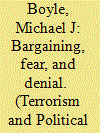

|
|
|
|
|
| Publication |
2009.
|
| Summary/Abstract |
From mid-2004 to mid-2007, the Iraq war was distinguished from other comparable insurgencies by its high rates of civilian victimization. This has been attributed to a number of different factors, including the role of Islamic fundamentalist groups such as al-Qaeda in Iraq as well as the regional ambitions of Iran and Syria. Using an unpublished dataset of violence in Iraq from 2003-2008 from the Iraq Body Count (IBC), this paper argues that the violence against civilians is best understood as a combination of three interacting logics-bargaining, fear, and denial-that are predominantly local in character. First, armed Iraqi actors bargained through violence both across and within sectarian communities, and were driven by mechanisms of outbidding and outflanking to escalate their attacks on civilians. Second, the pervasive fear about the future of the Iraqi state encouraged the "localization" of violence in Iraq, particularly in the emergence of a security dilemma and the proliferation of criminal and tribal actors. Finally, Islamist groups such as al-Qaeda in Iraq played the spoiler in Iraq, using mass-casualty attacks to generate fear among the population and deny U.S. efforts to build a functioning state. Only by addressing each of these three logics as part of its counter-insurgency strategy can the U.S. put an end to violence against civilians and develop the Iraqi state into a credible competitor for the loyalties of the population.
|
|
|
|
|
|
|
|
|
|
|
|
|
|
|
|
| 2 |
ID:
087761
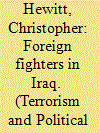

|
|
|
|
|
| Summary/Abstract |
Statistics on the national origin of almost one thousand killed and captured foreign fighters in Iraq reveal noticeable differences among Muslim majority countries in their jihadism rate (number of fighters/million population). These cross-national differences are used to test different theories as to the causes of Islamist extremism. The findings do not support those theories which see the cause of jihadism in the political and economic failures of Muslim societies, since the foreign fighters come from the more developed countries. The foreign fighters also come from the more religious societies, and from those societies "occupied" by U.S. or Israeli military forces.
|
|
|
|
|
|
|
|
|
|
|
|
|
|
|
|
| 3 |
ID:
087764


|
|
|
|
|
| Publication |
2009.
|
| Summary/Abstract |
In this paper we review and extend measures of political mobilization: the increasing extremity of beliefs, feelings, and behaviors in support of inter-group conflict. Building on previous research, we introduce the Activism and Radicalism Intention Scales (ARIS). The Activism Intention Scale assesses readiness to participate in legal and non-violent political action, whereas the Radicalism Intention Scale assesses readiness to participate in illegal or violent political action. In ad-hoc samples of U.S. and Ukrainian undergraduates, and in an Internet panel survey representative of the U.S. population, Activism and Radicalism intentions formed two correlated but distinguishable dimensions. The popular "conveyor belt" metaphor of radicalization (implying that activism leads easily to radicalism and that most radicals emerge from activism) found only mixed support in our results. Discussion suggests the potential usefulness of the ARIS for learning about how individuals move from political attitudes and beliefs to political action, including political violence and terrorism.
|
|
|
|
|
|
|
|
|
|
|
|
|
|
|
|
| 4 |
ID:
087766
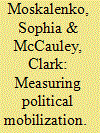

|
|
|
|
|
| Publication |
2009.
|
| Summary/Abstract |
In this paper we review and extend measures of political mobilization: the increasing extremity of beliefs, feelings, and behaviors in support of inter-group conflict. Building on previous research, we introduce the Activism and Radicalism Intention Scales (ARIS). The Activism Intention Scale assesses readiness to participate in legal and non-violent political action, whereas the Radicalism Intention Scale assesses readiness to participate in illegal or violent political action. In ad-hoc samples of U.S. and Ukrainian undergraduates, and in an Internet panel survey representative of the U.S. population, Activism and Radicalism intentions formed two correlated but distinguishable dimensions. The popular "conveyor belt" metaphor of radicalization (implying that activism leads easily to radicalism and that most radicals emerge from activism) found only mixed support in our results. Discussion suggests the potential usefulness of the ARIS for learning about how individuals move from political attitudes and beliefs to political action, including political violence and terrorism.
|
|
|
|
|
|
|
|
|
|
|
|
|
|
|
|
| 5 |
ID:
087768
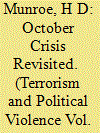

|
|
|
|
|
| Publication |
2009.
|
| Summary/Abstract |
Counterterrorism is generally understood in terrorism research as the product of rational strategic choice by governments. This is rarely the case, however: Strategic choice is often heavily circumscribed by the effects of crisis, when factors become significant drivers of government action. This paper uses the October Crisis of 1970 to demonstrate how the assumption of rational choice can be very misleading, and argues that scholarly research on counterterrorism needs a more nuanced understanding of how a governments' intent is translated into action
|
|
|
|
|
|
|
|
|
|
|
|
|
|
|
|
| 6 |
ID:
087763
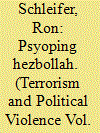

|
|
|
|
|
| Publication |
2009.
|
| Summary/Abstract |
The 2006 War between Israel and Hezbollah had a significant component of PSYOP. For the first time in its military history Israel deployed PSYOP as an inseparable part of its military operations. The performance of the PSYOP unit was less than satisfactory due to organizational factors and the general conduct of the war itself. This article analyzes the goals, the themes, and the delivery channels used throughout the PSYOP campaign. An attempt is made to answer the key question of whether this effort was effective.
|
|
|
|
|
|
|
|
|
|
|
|
|
|
|
|
| 7 |
ID:
087770


|
|
|
|
|
| Publication |
2009.
|
| Summary/Abstract |
Existing typological frameworks do not adequately categorize terrorist groups by their operational characteristics. We propose a new framework which compares terrorist groups to business firms. In our framework, terrorist groups are mapped on two axes: centralization of resources and centralization of operations. We separate terrorist groups into four typologies echoing familiar business arrangements: Hierarchy, Venture Capital, Franchise, and Brand. Responses to each typology are briefly sketched out. We conclude by analyzing the changes in Al Qaeda over the last two decades in the context of our framework. We close by proposing appropriate policy responses to combat Al Qaeda in light of its current Brand typology.
|
|
|
|
|
|
|
|
|
|
|
|
|
|
|
|
| 8 |
ID:
087760
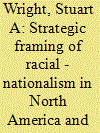

|
|
|
|
|
| Publication |
2009.
|
| Summary/Abstract |
Following the deadly Oklahoma City bombing in 1995, far-right racialist leaders responded rapidly to changes in the political environment, disavowing militia and Patriot violence and exploiting increased public concerns about immigration and the growth of nonwhite populations. Evidence suggests that Patriot movement demobilization may have actually helped to swell the ranks of racial-nationalists. As attention to political violence shifted to international terrorism in the aftermath of September 11, racial-nationalist movement actors again moved quickly to seize the opportunity. The strategic framing of the crisis by racial-nationalist leaders revealed the existence of a transnational network of allies promoting a two-pronged message, 1) a virulent anti-Semitic assault on pro-Israel U.S. foreign policy and 2) a broadside on immigration and multiculturalism. The lineaments of these transnational networks are analyzed in an effort to explain a "trajectory of contention" regarding this emergent movement. Possible links between racial-nationalists and Islamic militants are also explored.
|
|
|
|
|
|
|
|
|
|
|
|
|
|
|
|
| 9 |
ID:
087769
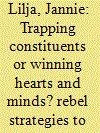

|
|
|
|
|
| Publication |
2009.
|
| Summary/Abstract |
Why do rebels choose violence over non-violent methods to attain the cooperation of their constituency in the war against the government? This article assesses the importance of rebels' dependency on constituent support through a case study of the LTTE in Sri Lanka. The empirical findings suggest that dependency largely results in non-violent measures. However, a multitude of passive coercion methods - broadly unaccounted for by existing theory - evolve over time in the form of territorial and social entrapments. This implies that rebels do not need the hearts and minds of their people to wage war at later stages of conflict. Time pressure, however, appears to result in violence.
|
|
|
|
|
|
|
|
|
|
|
|
|
|
|
|
|
|
|
|
|